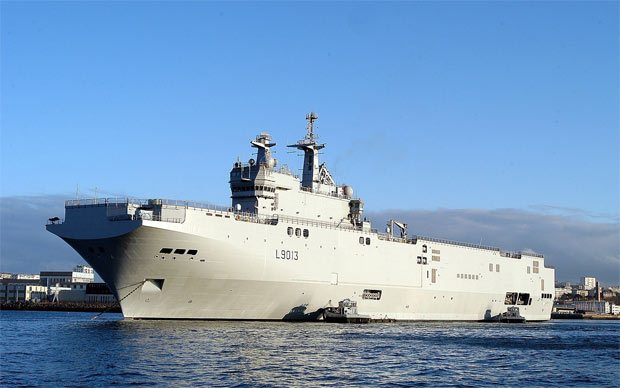Russia does not produce the type of fuel necessary for the French-made Mistral-class amphibious assault vessels it has ordered, Deputy Prime Minister Dmitry Rogozin said Tuesday.
The Mistral class are powered by electric motors supplied by diesel-powered turbo generators, according to naval-technology.com. Diesel fuel can suffer from a condition known as waxing or gelling in cold conditions, causing it to clog up fuel injection systems, naval systems engineers say. The condition can be corrected by use of certain chemical additives, or pre-heating the fuel, as is done in some cars.
“Probably, our chemists will prepare some special additives to solve this problem,” Rogozin, who oversees Russia’s military industry, told reporters on Tuesday. In January, Rogozin criticized the 1.2 billion euro deal to buy the ships, saying they would not be able to operate in cold weather, but did not then specify the reason.
The problem probably arose because Europe uses slightly different, cleaner diesel than Russian marine diesels, said an oil refinery engineer in London who spoke to RIA Novosti on condition of anonymity.
“The Russians could probably make the right grade fuel at a refinery of theirs somewhere, but then you have the problem of specially transporting and storing it,” he said. “You couldn’t just stick that fuel in the existing storage system and expect it to be clean.”
Using Russian-made fuel in the Mistrals might possibly cause minor damage over long periods, or invalidate the engines’ warranties, he said.
Specialists from both countries will discuss issues concerning the Mistral ships, including the fuel problem, during bilateral military talks to be held on February 14-15.
Rogozin said insufficient scientific advice had been taken in Russia prior to the latest decisions about purchases of arms and military equipment. “The devil is in the detail, so now we are looking into the problems that we might face when using those ships,” Rogozin said.
Russia signed the deal in 2011 for its two Mistral-class ships, the first of which is due for delivery in 2014 and the second in 2015. The defense minister at that time was Anatoly Serdyukov, who was sacked in November 2011 after being tainted by a corruption scandal involving his ministry.
Rogozin repeated Russia would stick to its commitments under the deal, despite his critical comments about Mistral.
“I want to stress out again Russia will fulfil all its obligations mentioned in the signed contracts, so those worries which our French friends have should only be little ones – at least over the ships on the French wharves,” Rogozin said.










